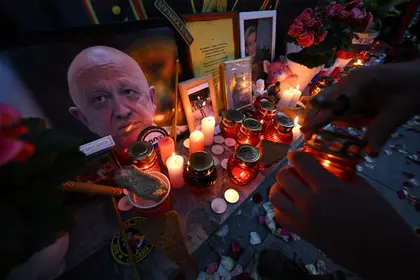Yevgeny Prigozhin died under suspicious circumstances when his private jet came down en route from Moscow to St. Petersburg on Aug. 23. Sunday was the 40th day since his death which, in the Orthodox tradition, is when the soul makes its final journey to either heaven or hell.
As dozens of former fighters and their families held memorial services for Prigozhin, in which they hailed him as a hero of the people, Russian Telegram channels posted a photograph of what is claimed to be Prigozhin’s will.
JOIN US ON TELEGRAM
Follow our coverage of the war on the @Kyivpost_official.
The supposed will indicates that his 25-year-old son Pavel is the sole inheritor of his millions, properties and the private militia.
“All my property… as well as property that may be acquired by me in the future, I bequeath to Pavel Yevgenyevich Prigozhin,” Prigozhin’s will says.
It also obligates Pavel to provide for his grandmother Violetta, Prigozhin’s widow, Pavel’s two sisters and a grandson.
The will, which was apparently notarized on March 2, leaves cash, assessed at around $130 million, a three-story house in St. Petersburg, shares in nine joint stock companies including Prigozhin’s catering firm, and Wagner. It has also been suggested that Pavel will seek to recover debts of $827 million (owed to Concord by the Russian defense ministry.
The VChK-OGPU Telegram channel, which has links with Russian government agencies, says that the will may be challenged by other members of the Prigozhin family.

Russian Milbloggers Blame Poor Security for Sabotage ‘Epidemic’ on Airfields
On Sept. 29 the Washington-based Institute of Study of War (ISW) and the UK’s Defence Intelligence assessment was that the leadership of Wagner had devolved to Andrei Troshev, a former Wagner senior commander who now serves in the Ministry of Defense and was publicly endorsed by President Vladimir Putin.
ISW reported on Oct. 1 that this was unpopular within parts of the Wagner leadership and that it could lead to the emergence of the younger Prigozhin as an alternative leader.
The think tank says that Russian social media reports that Pavel had already assumed “command” of the Wagner Group and is in negotiations with Viktor Zolotov, head of Rosgvardia (the National Guard of Russia) about the potential re-engagement of members of the Wagner Group.
This was seen as a way for Wagner fighters to avoid entering into contracts with the Russian ministry of defense and allow the group to retain its name and autonomy. Whether Pavel will become its leader remains to be seen – as does the potential of bringing Wagner into renewed conflict with the Kremlin.
ISW says it is unclear how the Kremlin perceives the relationship between Wagner and different elements of the Russian government. Rosgvardia is directly subordinate to the Russian Presidential Administration, so a direct relationship between it and Wagner would be counter-intuitive after Putin’s public support of Troshev.
Rosgvardia and any subordinate Wagner elements would rely on the defense ministry for equipment, weaponry and ammunition, as Zolotov has little logistical infrastructure of his own.
The VChK-OGPU Telegram channel reports that the Wagner’s personnel department in Moscow had re-opened and was contacting all of those former fighters who had not become affiliated with Troshev, with suggestions that the disgraced Gen. Sergey Surovikin may be linked to the new leadership.
The ISW conclusion seems to be: “watch this space” and will revise its assessment should Wagner eventually reform in its previous unitary organization whether under Rosgvardia, the Ministry of Defense, or some other organization.
You can also highlight the text and press Ctrl + Enter






